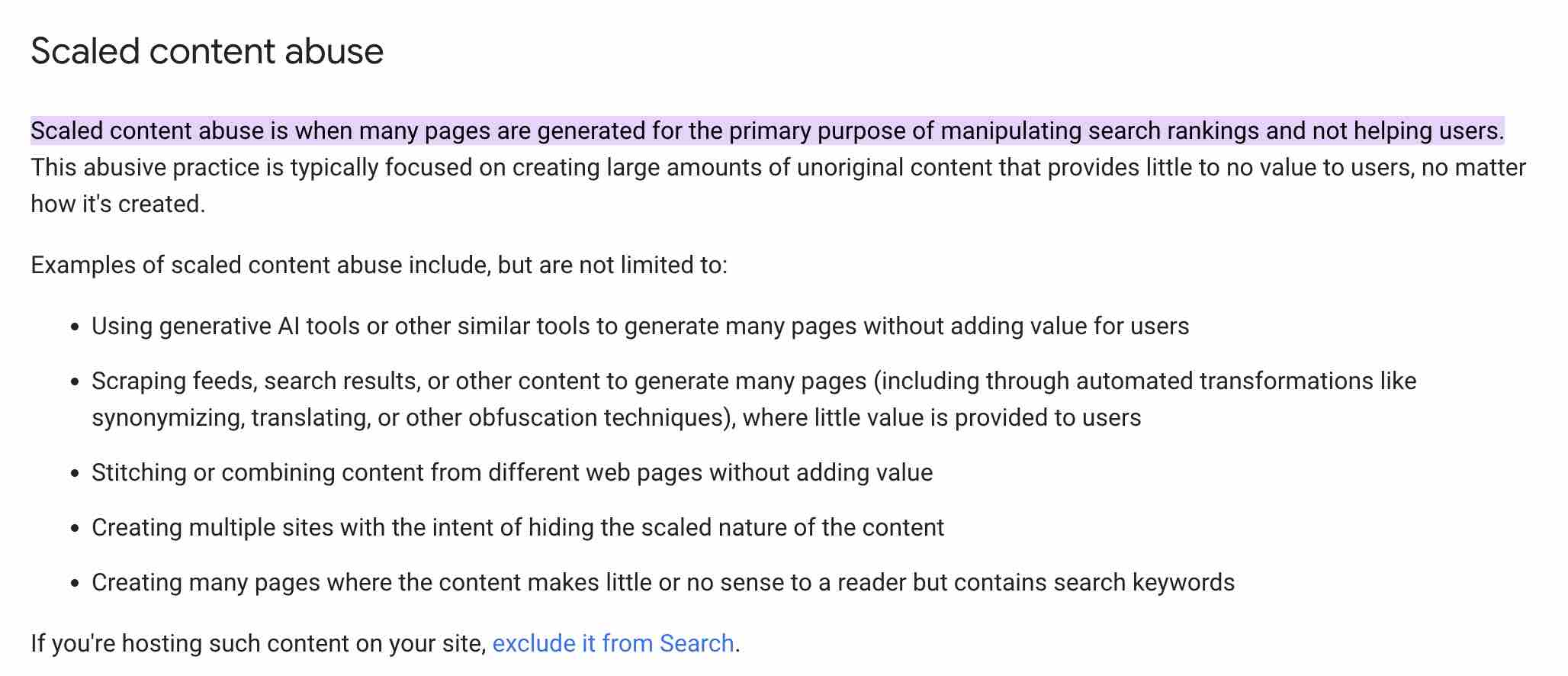I hope you enjoy reading this blog post.
If you want my team to do your SEO & digital marketing for you, click here.
Article Overview
Google’s March 2024 Core Update focuses on your website’s content and how it determines whether it is informative, helpful, and on topic.
I’ve blogged about this before: You cannot spam your way to the top of the search results with repetitive over-optimisation of your core keywords. Instead, you must spend the time, effort, and resources to write copy directed toward your customers and not the Google algorithm. In Google’s own words, they tell us plainly that: We’re making algorithmic enhancements to our core ranking systems to ensure we surface the most helpful information on the web and reduce unoriginal content in search results. I strongly suggest you read this article as proof of what I’m saying and to illustrate further how determined Google is to keep low-quality websites out of the search results. Read here.
Next, Google will start de-indexing pages deemed low quality, with poor user experience, or sites created purely to target a specific keyword without any relevance. The winners will be sites that have invested in quality copy and a better user experience, as well as sites that are on topic and address users’ search queries clearly and succinctly.
In this article, SEO Sydney Experts will analyse the full update and give real examples of what can happen if you try to game the system and beat Google’s algorithm.
What’s The New Update?
The algorithm update was rolled out on March 5 to discourage abusive SEO practices by producing low-quality content via three areas.
- Expired Domain Abuse
- Scaled Content Abuse
- Site Reputation Abuse
For site owners that ignore these changes, you have been warned and expect shortly to either appear lower in the search results, have your site de-indexed or have a manual action implemented. I’ve seen rankings plummet to page 10 from # 1 in a split second with these updates. Let’s investigate further and see if any of these pertain to your website.
Scaled Content Abuse
This update is essential and looks at low-quality web copy, whether manually or AI-written. We all know that AI is all the rage now, and everyone is getting on board with this, but be warned: Google’s not a huge fan. If your website is spammy by using repetitive keywords to manipulate rankings or you have an overreliance on AI chat Apps, then you are practising scaled abuse content. In their article, Google explicitly warned people about this practice: Spam policies for Google web search.
So, if you have, for example, copied and pasted content from a few websites and cobbled it together to make it seem as though it’s original, you’ll get caught. Or, if you are writing many pages that make no sense to the reader but do to the search engines, again, you’ll cop a penalty of some sort.

Site Reputation Abuse
Also known as Parasite SEO, you post an article on a high DA site (you might have to pay for this as a sponsored post) to rank for a particular keyword. So, for example, you want to rank for the keywords ‘tennis shoes’ and publish content on another website with spammy links to your site; this looks untrustworthy as you are riding on the coattails of another site, which is common among high DA news websites. If you are trying to rank for the keyword best plumbers Sydney, then Parasite SEO would happen if you managed to get an article on a high DA website with the exact blog title ‘best plumbers Sydney’. Sure, it may rank quickly, but Google will pick up on this eventually in this new algorithm update.
Expired Domain Abuse
Expired domain abuse happens when you buy an expired domain name and use its authority to post content. For example, you might buy a domain name that’s in the legal niche, but you’re in the medical niche. As you can see from below:
You buy a domain name: www.examplebusinesslegal.com.au
and repurpose it for a business in the cosmetic surgery niche, with all your content being cosmetic-related. Google hates this, as you are buying a URL that has zero relevance to your business and is deemed spammy. It will confuse the public regarding the site’s primary intention. And that the content posted is reliable from a trustworthy source.
Conclusion – SEO Sydney Experts
If your site is not ranking or you’ve been paying an SEO company that is not performing well and your website is slumping, I suggest you read these two article as they are helpful:
Creating helpful, reliable, people-first content
Spam policies for Google web search
As a business owner, you probably won’t have time to go through all the finer points, and if you’re not an SEO nerd, these might be confusing, but you might be able to pick up on a few points, which should raise alarm bells, especially if you’ve never attained decent Google rankings. However, if your SEO agency is writing content by actual content writers and not relying on AI, you should be okay with that. And, if they comply with best practices and are not overly dodgy, your rankings should be fine. After all, they just want legitimate, credible websites to rank, not fraudulent ones. It’s the right thing to do, and Google is doing an excellent job at this. If you are reading this article and stressing out a bit. In that case, I suggest you contact me so we can look at your site backlink profile and content and address and make the necessary amends before Google completely finishes its algorithmic rollout on May 5 2024.








